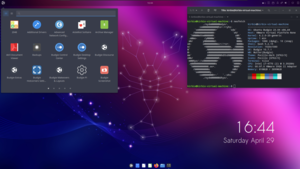
Ubuntu is a Linux distribution derived from Debian and composed mostly of free and open-source software. Ubuntu is officially released in multiple editions: Desktop, Server, and Core for Internet of things devices and robots. The operating system is developed by the British company Canonical, and a community of other developers, under a meritocratic governance model. As of April 2024, the most-recent release is and the current long-term support release is 24.04.

Kubuntu is an official flavor of the Ubuntu operating system that uses the KDE Plasma Desktop instead of the GNOME desktop environment. As part of the Ubuntu project, Kubuntu uses the same underlying systems. Kubuntu shares the same repositories as Ubuntu and is released regularly on the same schedule as Ubuntu.
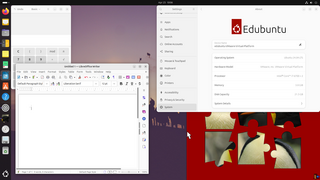
Edubuntu, previously known as Ubuntu Education Edition, is an official derivative of the Ubuntu operating system designed for use in classrooms inside schools, homes and communities.

Xubuntu is a Canonical Ltd.–recognized, community-maintained derivative of the Ubuntu operating system. The name Xubuntu is a portmanteau of Xfce and Ubuntu, as it uses the Xfce desktop environment, instead of Ubuntu's customized GNOME desktop.

Ubuntu Studio is a recognized flavor of the Ubuntu Linux distribution, which is geared to general multimedia production. The original version, based on Ubuntu 7.04, was released on 10 May 2007.

Ubuntu releases are made semiannually by Canonical Ltd, its developers, using the year and month of the release as a version number. The first Ubuntu release, for example, was Ubuntu 4.10 and was released on 20 October 2004. Consequently, version numbers for future versions are provisional; if the release is delayed until a different month than planned, the version number will change accordingly.

Lubuntu is a lightweight Linux distribution based on Ubuntu that uses the LXQt desktop environment in place of GNOME. Lubuntu was originally touted as being "lighter, less resource hungry and more energy-efficient", but now aims to be "a functional yet modular distribution focused on getting out of the way and letting users use their computer".
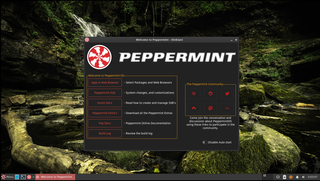
Peppermint OS is a Linux distribution based on Debian and Devuan Stable, and formerly based on Ubuntu. It uses the Xfce desktop environment. It aims to provide a familiar environment for newcomers to Linux, which requires relatively low hardware resources to run.

Ubuntu Unity is a Linux distribution based on Ubuntu, using the Unity interface in place of Ubuntu's GNOME Shell. The first release was 20.04 LTS on 7 May 2020. Prior to the initial release it had the working names of Unubuntu and Ubuntu Unity Remix.
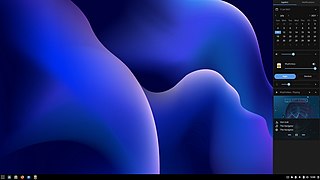
Solus is an independently developed operating system for the x86-64 architecture based on the Linux kernel and a choice of Budgie, GNOME, MATE or KDE Plasma as the desktop environment. Its package manager, eopkg, is based on the PiSi package management system from Pardus Linux, and it has a semi-rolling release model, with new package updates landing in the stable repository every Friday. The developers of Solus have stated that Solus was intended exclusively for use on personal computers and will not include software that is only useful in enterprise or server environments.

elementary OS is a Linux distribution based on Ubuntu LTS. It promotes itself as a "thoughtful, capable, and ethical" replacement to macOS and Windows and has a pay-what-you-want model. The operating system, the desktop environment, and accompanying applications are developed and maintained by elementary, Inc.

Ubuntu Kylin is the official Chinese version of the Ubuntu computer operating system. It is intended for desktop and laptop computers, and has been described as a "loose continuation of the Chinese Kylin OS". In 2013, Canonical Ltd. reached an agreement with the Ministry of Industry and Information Technology to co-create and release an Ubuntu-based operating system with features targeted at the Chinese market.

Ubuntu GNOME is a discontinued Linux distribution, distributed as free and open-source software. It used a pure GNOME 3 desktop environment with GNOME Shell, rather than the Unity graphical shell. Starting with version 13.04 it became an official "flavour" of the Ubuntu operating system.

LXLE is a Linux distribution based upon the most recent Ubuntu/Lubuntu LTS release, using the LXDE desktop environment. LXLE is a lightweight distro, with a focus on visual aesthetics, that works well on both old and new hardware.

Ubuntu MATE is a free and open-source Linux distribution and an official derivative of Ubuntu. Its main differentiation from Ubuntu is that it uses the MATE desktop environment as its default user interface, instead of the GNOME 3 desktop environment that is the default user interface for Ubuntu.

KDE neon is a Linux distribution developed by KDE based on Ubuntu long-term support (LTS) releases, bundled with a set of additional software repositories containing the latest versions of the Plasma 6 desktop environment/framework, Qt 6 toolkit and other compatible KDE software. First announced in June 2016 by Kubuntu founder Jonathan Riddell following his departure from Canonical Ltd., it has been adopted by a steadily growing number of Linux users, regularly appearing in the Top 20 on DistroWatch.com's popularity tables.
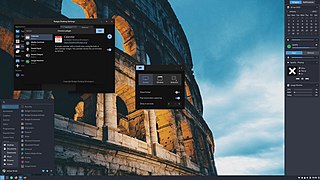
Budgie is an independent, free and open-source desktop environment for Linux and other Unix-like operating systems that targets the desktop metaphor. Budgie is developed by the Buddies of Budgie organization, which is composed of a team of contributors from Linux distributions such as Fedora, Debian, and Arch Linux. Its design emphasizes simplicity, minimalism, and elegance, while providing the means to extend or customize the desktop in various ways. Unlike desktop environments like Cinnamon, Budgie does not have a reference platform, and all distributions that ship Budgie are recommended to set defaults that best fit their desired user experience.

Pop!_OS is a free and open-source Linux distribution, based on Ubuntu, and featuring a customized GNOME desktop environment known as COSMIC. The distribution is developed by American Linux computer manufacturer System76. Pop!_OS is primarily built to be bundled with the computers built by System76, but can also be downloaded and installed on most computers.

Ubuntu Cinnamon is a community-driven, free and open-source Linux distribution based on Ubuntu, using the Cinnamon desktop environment in place of Ubuntu's GNOME Shell. The first release was 19.10 'Eoan Ermine' on December 4, 2019, and is the first official distribution to use Ubuntu with the Cinnamon desktop. Ubuntu Cinnamon Remix is also used synonymously to reference the project.
